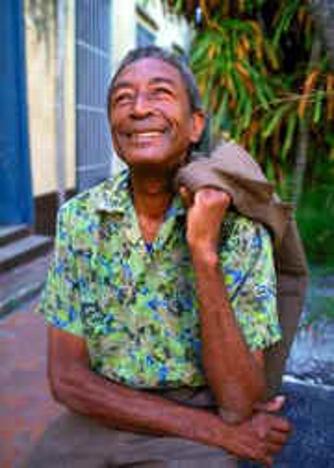| LAZARO ROS
Songs To Elegua
|
|
|
|
The Album
This album is an invocation and dedication to the orisha Elegua, the mischievous child-messenger who opens the gates, rules the crossroads and without whom no ceremony can begin. Recorded especially for the opening of Ashé Records, this state of the art recording is the first and and only time an entire cycle of Eleguá songs has been recorded and released to the public.
These songs are sung in their original Yoruban in the nasal style that Lazaro Ros learned as a child from the elders who had brought their traditions of their ancestors with them to Cuba. The rhythms and melodies which accompany these ceremonies, still practiced in Cuba today, are West African in origin and present in many forms of Latin popular music and jazz. Here they are presented in their purest and most profound form.
Lazaro Ros is accompanied by Olorun, an ensemble of drummers and singers from his hometown of Guanabacoa, one of Cuba's most important repositories of African culture, often called the 'city of the gods'. The album cover photo was taken in Guanabacoa at the home of Maria, one of Olorun's singers. Her daughter, Amira, has been a priestess of Elegua since she was six.
Songs for Elegua was recorded in Havana in Egrem Studios through the night of June 12, 1996 -- June 12 being the Day of Elegua. In the morning it was discovered that the great Afro-Cuban sacred singer Mercedes Valdes had passed away during that night. This album is dedicated to her spirit and her memory.
|
|
PREMIO CUBADISCO
BEST FOLKLORIC ALBUM
|
 |
| photo by Cynthia Carris |
|
| The Artist
Lazaro Ros
(b. May 11, 1925 – d. February 8, 2005)
Lazaro Ros, was Cuba’s foremost akpwon (singer of ceremonial songs which invoke the orishas, deities of the Yoruban pantheon.) Beloved throughout the world, he was considered one of Cuba's national treasures.
Ros was born in the Santos Suarez district of Havana, Cuba. He began singing at Afro-Cuban ceremonies at the age of 13. After the Cuban Revolution in 1959 Ros was a founding member of Conjunto Folklorico Nacional de Cuba, with whom he travelled and performed throughout the world.
Lazaro Ros combined his respect for the traditions and lineage of his ancestors with an adventurous musical spirit. He collaborated with Cuban jazz-rock-fusion band Sintesis on the landmark album Ancestros and with Grupo Mezcla on Cantos. Both albums present the traditional orisha songs with modern instrumentation and arrangements. His traditional group of drummers and singers, Olorun, played with him both at ceremonies and onstage and in the recording studio. During his lifetime he received many honors, including several Grammy and Latin Grammy nominations. In 2005, the year of his death, he was awarded the Orden Felix Varela First Degree, Cuba's highest cultural honor.
|
THE ORIGINS OF ELEGUA by Francisco Valdes
In the times when the gods took human form and acted like any of us, Olófin came down to Earth and got sick. It was very, very serious. It appeared that Babá was doomed to meet with Ikú -- death -- who trembled with the idea of being the one to put an end to the presence of the Almighty on the Earth. All the Orishas went to Olófin's house to ask him to use his power and drive the disease away, to which he answered: "The Earth and everything on it was made by Obatalá at my request, and my work can't be so imperfect that we can't find someone to cure me.”Meanwhile, there was a child who kept insisting to his mother that he knew of some plants that were capable of curing Olófin. Finally, just to please him, his mother agreed to take him there. He said, “Father, I’ve come to cure you,” and patiently made Olófin drink the brew he had made. Soon Babá's health showed signs of daily improvement. The child cured Babá in seven days. During that time he looked into that child's soul and after the seven days he convened all the Orishas and said: "Look carefully at this child: His name is Eleguá and from today onwards he will be the beginning and the end of everything. The first in all offerings. He will approve everything that is done in Osha. He will collect all tributes in every ceremony. He will be the punisher of all those who don't take him into account and try to do without him. I thus give him the keys, which open, close and clear all the roads. He will be the master of the four cardinal points, of the confusing and guiding swirl, and of the paper kite so that he can raise to me his petitions, invocations and determinations. He shall be the depository of Destiny with all its vicissitudes; of the timely and the untimely; of the foreseen and the unforeseen, of the right and the wrong; in summary, he shall be the census of the one hundred and one personality archetypes that make up the human family. He shall be the end of things, to renew them and make them more beautiful. I endow him with the gift of never losing the innocence of a child, so that he can always judge things for what they are and never for their appearance. And that's how it was, is, and will be.
|
|